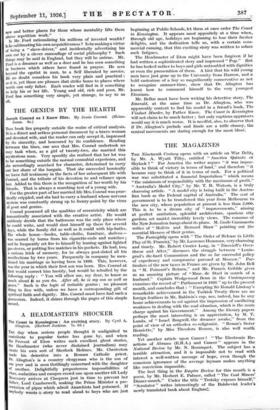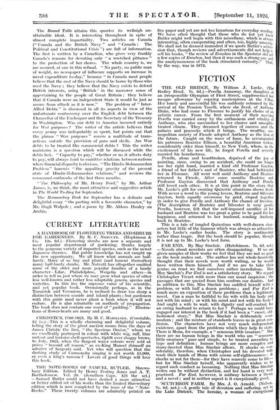THE MAGAZINES
Tan Nineteenth Century opens with an article on War Debts by Mr. A. Wyatt Tilby, entitled " America Quixote or Shylock ? " For America the writer argues " it was impos- sible to think of victory in terms of land," and therefore " it became easy to think of it in terms of cash. For a political war was substituted a financial Imperialism " which means "the minimum of responsibility with the maximum of profit." " Australia's Model City," by Mr. T. R. Watson, is a truly charming article. " A model city is being built in the Austral lian bush as the Federal capital of Australia." The seat of government is to be transferred this year from Melbourne to the new city, whose population at present is less than 5,000. This is to be a dream city of " improvements," aiming at perfect sanitation, splendid architecture, spacious city gardens set amidst incredibly lovely views. The romance of the New Jerusalem hangs about its plans. M. Emile Cammaerts writes of " Moliere and Bernard Shaw " pointing out the essential likeness of their genius.
The Fortnightly' opens with " The Order of Release (a Little Play of St. Francis)," by Mr. Laurence Housman, very charming and timely. Mr. Robert Crozier Long, in " Zinovieff's Over- throw and After," discusses the struggle between " Lenin- grad's die-hard Communism and the so far successful policy of expediency and compromise pursued at Moscow." Par- ticulars of the new taxes in France are given by Mr. John Bell in " M. Poincare's Return," and Mr. Francis Gribble gives us an amusing picture of " Mme. de Stael in .search of a husband." Captain Wedgewood Henn in the Contemporary examines the record of " Parliament in 1926 " up to the present month, and concludes that : " Excepting Sir Ronald Lindsay's remarkable achievement in the Turkish Treaty there are no foreign feathers in Mr. Baldwin's cap, nor, indeed, has he any home achievements to set against the impression of vacillating weakness in dealing with the coal situation, which is the main charge against his Government." Among the literary papers perhaps the most interesting is an appreciation, by M. T. Landa, of " Israel Zangwill, the dreamer awake," from the point of view of an orthodox co-religionist. " Renan's Sister Henriette," by Miss Theodora Roscoe, is also well worth' reading.
Yet another article upon Cancer I " The Electronic Re- actions of Abrams (E.R.A.) and Cancer " appears in the National Review by Mr. N. Bosanquet. The subject has a terrible attraction, and it is impossible not to read with interest a well-written message of hope, even though the conscious ignorance of the average layman makes anything like conviction impossible.
The best thing in the Empire Review for this month is a poem, by Mr. Herbert E. Palmer, called " The Coal Miners' Dinner-march." Under the title " Trotsky exposes himself," " Scrutator " writes interestingly of the Bolshevist leader'a newly translated book about England:: The Round Table attains this quarter its wellnigh un- attainable ideal. It is interesting throughout in spite of almost complete impartiality. Two articles on Canada (" Canada and the British Navy " and " Canada : The Political and Constitutional Crisis ") are full of information. The first is written by a Canadian, who gives very frankly Canada's reasons for devoting only " a wretched pittance " to the protection of her shores. The whole country is, we are assured, at one in this refusal. " No party, no public man of weight, no newspaper of influence supports an increase in naval expenditure to-day," because " in Canada most people believe that the cost of the Navy should be borne by those who need the Navy ; they believe that the Navy exists to defend British interests, using ' British ' in the narrower sense of appertaining to the people of Great Britain ; they believe that if Canada were an independent State it would be just as secure from attack as it is now." The problem of " Inter- Allied Debts " is discussed in all its aspects in view of the unfortunate controversy over the English debt between the Chancellor of the Exchequer and the Secretary of the Treasury in Washington. Was our debt to America incurred entirely for War purposes ? The writer of the article believes that every penny was indisputably so spent, but points out that the phrase " War purposes " covers a multitude of trans- actions outside the provision of guns and shells. Are War debts to be treated like commercial debts ? This the writer maintains is a question which will be discussed while the debts last. " Capacity to pay," whether or no it affects duty to pay, will always tend to embitter relations between nations where financial disparity is obvious. " The Hindu-Mohammedan Problem" laments the appalling gravity of the present state of Hindu-Mohammedan relations," and reviews the communal outbreaks of the last three months.
" The Philosophy of Mr. Henry Ford," by Mr. Arthur James, is, we think, the most attractive and suggestive article in The Work/ To-Day for September.
The Bermondsey Book for September has a delicate and delightful essay " On parting with a favourite character," by Mr. Hugh Walpole ; and a poem by Mr. Aldous Huxley on Arabia.







































 Previous page
Previous page